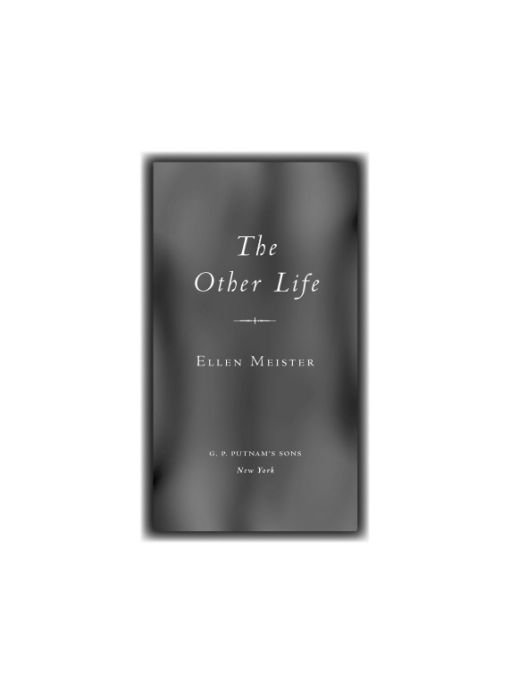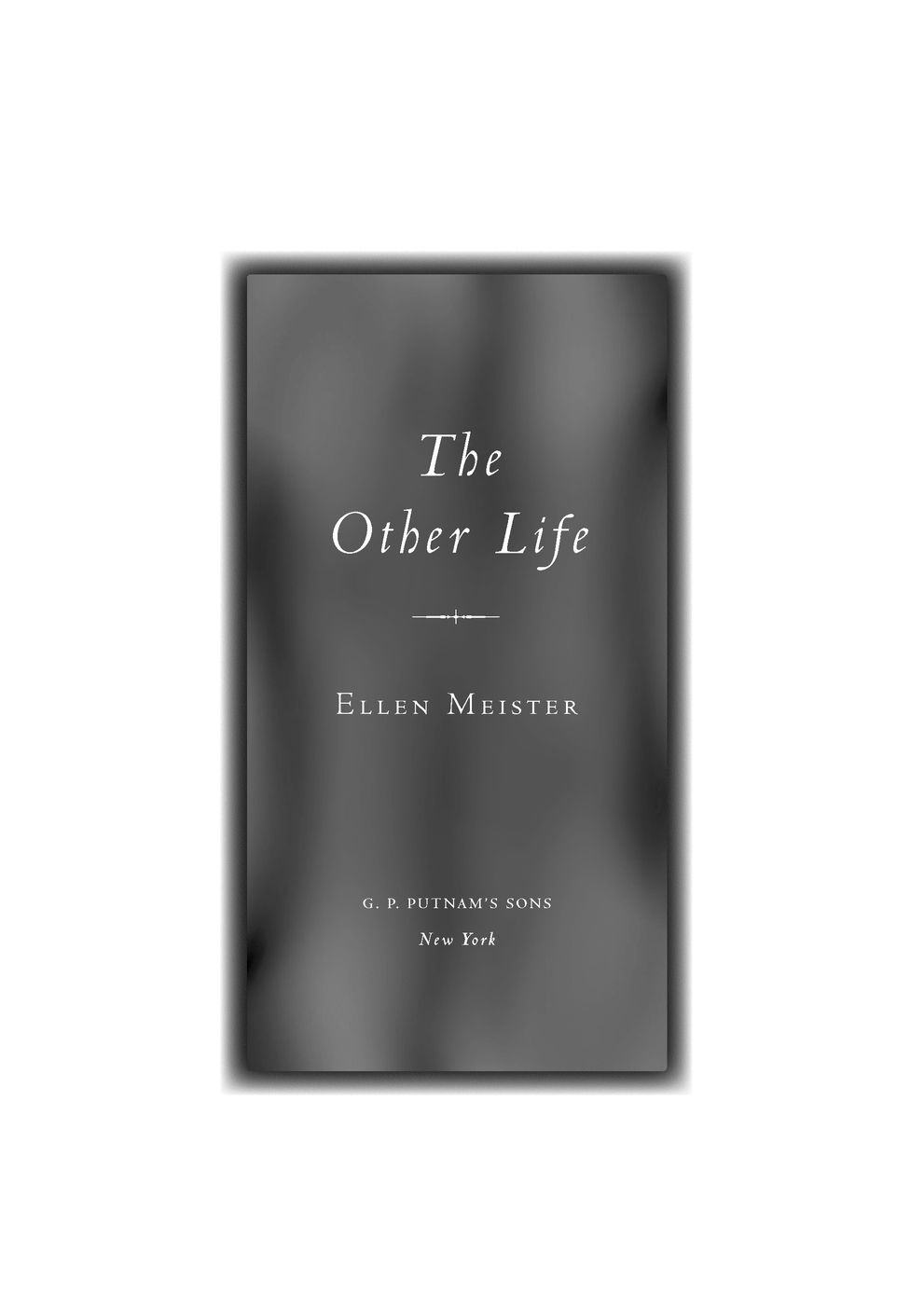The Other Life
Authors: Ellen Meister


Table of Contents

PUTNAM
G. P. PUTNAM’S SONS
Publishers Since 1838
Published by the Penguin Group
Penguin Group (USA) Inc., 375 Hudson Street, New York, New York 10014, USA •
Penguin Group (Canada), 90 Eglinton Avenue East, Suite 700, Toronto, Ontario M4P 2Y3,
Canada (a division of Pearson Penguin Canada Inc.) • Penguin Books Ltd, 80 Strand,
London WC2R 0RL, England • Penguin Ireland, 25 St Stephen’s Green, Dublin 2, Ireland
(a division of Penguin Books Ltd) • Penguin Group (Australia), 250 Camberwell Road,
Camberwell, Victoria 3124, Australia (a division of Pearson Australia Group Pty Ltd) •
Penguin Books India Pvt Ltd, 11 Community Centre, Panchsheel Park, New Delhi-110 017,
India • Penguin Group (NZ), 67 Apollo Drive, Rosedale, North Shore 0632, New Zealand
(a division of Pearson New Zealand Ltd) • Penguin Books (South Africa) (Pty) Ltd,
24 Sturdee Avenue, Rosebank, Johannesburg 2196, South Africa
Publishers Since 1838
Published by the Penguin Group
Penguin Group (USA) Inc., 375 Hudson Street, New York, New York 10014, USA •
Penguin Group (Canada), 90 Eglinton Avenue East, Suite 700, Toronto, Ontario M4P 2Y3,
Canada (a division of Pearson Penguin Canada Inc.) • Penguin Books Ltd, 80 Strand,
London WC2R 0RL, England • Penguin Ireland, 25 St Stephen’s Green, Dublin 2, Ireland
(a division of Penguin Books Ltd) • Penguin Group (Australia), 250 Camberwell Road,
Camberwell, Victoria 3124, Australia (a division of Pearson Australia Group Pty Ltd) •
Penguin Books India Pvt Ltd, 11 Community Centre, Panchsheel Park, New Delhi-110 017,
India • Penguin Group (NZ), 67 Apollo Drive, Rosedale, North Shore 0632, New Zealand
(a division of Pearson New Zealand Ltd) • Penguin Books (South Africa) (Pty) Ltd,
24 Sturdee Avenue, Rosebank, Johannesburg 2196, South Africa
Penguin Books Ltd, Registered Offices: 80 Strand, London WC2R 0RL, England
Library of Congress Cataloging-in-Publication Data
Meister, Ellen.
The other life / Ellen Meister.
p. cm.
The other life / Ellen Meister.
p. cm.
eISBN : 978-1-101-48615-3
1. Married women—Fiction. 2. Pregnant women—Fiction. 3. Marriage—Fiction. 4. Motherhood—Fiction. 5. Mothers and daughters—Fiction. 6. Domestic fiction. 7. Psychological fiction. 8. Love stories. I. Title.
PS3613.E4355O75
2011
2010028958
813’.6—dc22
This is a work of fiction. Names, characters, places, and incidents either are the product of the author’s imagination or are used fictitiously, and any resemblance to actual persons, living or dead, businesses, companies, events, or locales is entirely coincidental.
While the author has made every effort to provide accurate telephone numbers and Internet addresses at the time of publication, neither the publisher nor the author assumes any responsibility for errors, or for changes that occur after publication. Further, the publisher does not have any control over and does not assume any responsibility for author or third-party websites or their content.
For Max, Ethan, and
Emma
Emma
PROLOGUE

1973
On the day that Nan Gilbert decided to kill herself, she awoke sometime after noon to the sound of her neighbor playing the radio in his backyard. The song was new to her, but the voice was familiar. It was Paul Simon singing without Garfunkel. And though “Kodachrome” was a rueful song about the brightcolored days of youth, it seemed quaint to Nan, who couldn’t imagine that people still experienced the world in any kind of light.
Her life had become colorless. She’d been depressed before, Lord knows, but the darkness had never been so complete. It was as if the pregnancy had made everything utterly opaque. Sitting up, sipping the water by her bedside, rising—each action existed within a black box. There wasn’t a pinhole of light anywhere, and the concentration required to find her way from the beginning of a task to the end depleted her.
She stood in her bedroom trying to remember what it was she had set out to do. There was
something
. . . something.
something
. . . something.
Nan closed her eyes to shut out distractions and it appeared to her as a glint of silver. And there it was, her
X
-
Acto
knife. She could picture it—the chrome cylinder with a disposable triangular blade. It was in a can in the back room with her paintbrushes. She went to it.
X
-
Acto
knife. She could picture it—the chrome cylinder with a disposable triangular blade. It was in a can in the back room with her paintbrushes. She went to it.
Sitting in the easy chair by the window, she held the thing and examined her own reflection in the narrow tool. She could see only a single sliver of her face at a time. Her eyes. The middle of her nose. Her nostrils. Her lips. Pieces of who she used to be. Already she was thinking like someone on the other side.
No sense in even going into the bathroom to do it. She’d leave a mess either way. If she let herself bleed into the soft cushions of the chair, he could simply throw the whole thing away. Nothing of her would be left.
The flesh of her wrist looked gray in the sunlight, but the diagonal blue line was as vivid as a road map leading her away. She stuck in the tip of the blade and shivered at the sharpness of the pain. The sensation was so precise, it was close to pleasure. She drew the knife downward, opening her vein with glorious ease. Nan spread her knees so that she could lay her wrist on the cushion, letting the blood travel into the absorbent batting.
It didn’t take long for her toes and fingers to go cold. This is good, she thought. Soon she would fall asleep, and that would be it. The baby started to move in her belly. It was a small kick at first, and then a massive wave as it turned completely around.
“Shh,” she said, resting her good hand on her belly. “You won’t be alone.”
Nan closed her eyes and the baby turned again. It was a bigger movement than she’d ever felt.
“
Please
. . . don’t fight this,” she said, or maybe she just thought it. She couldn’t tell anymore if she was speaking or not. She started to drift and felt a great pressure as the baby pushed downward. I’m giving birth, she thought
,
right here, right now.
“
Please
. . . don’t fight this,” she said, or maybe she just thought it. She couldn’t tell anymore if she was speaking or not. She started to drift and felt a great pressure as the baby pushed downward. I’m giving birth, she thought
,
right here, right now.
“Push, Nan!” someone said. “Push!”
She opened her eyes to a bright rectangular light. Beyond it, she could make out her husband’s features. Her legs were in stirrups.
She closed her eyes and was back in the easy chair, dying. She opened them, and was in the delivery room, giving birth in beautiful Technicolor. The two realities made perfect sense to Nan. The decision to live and the decision to die were simply playing out simultaneously. To be or not to be. The choice was spectacularly hers alone.
Nan shut her eyes and floated in the darkness, letting it take her. Somewhere, a phone rang. She opened her eyes and the delivery room was gone. She was in the easy chair by the window, blood pooling between her legs. The baby was still now. She reached with her right hand and picked up the phone.
“I need help,” she said.
1
Present
QUINN BRAVERMAN HAD TWO SECRETS SHE KEPT FROM HER husband. One was that the real reason she chose him over Eugene, her neurotic, self-loathing, semi-famous ex-boyfriend, was to prove her mother wrong. She
could
have a relationship with a normal, stable man.
could
have a relationship with a normal, stable man.
The other was that Quinn knew another life existed in which she had made the other choice. The two lives ran in parallel lines, like highways on opposite sides of a mountain. There, on the other side, the Quinn who had stayed with Eugene was speeding through her high-drama, emotionally exhausting, childless urban life. Here, the Quinn who had married Lewis lived in the suburbs of Long Island, drove a Volvo, and was pregnant with her second child.
But the important part of the secret—the part that terrified and thrilled her—was that she knew it was possible to cross from one life to the other. There were portals.
Sometimes she discovered them by accident. Like last month at the supermarket, when she had her hand deep in a bin of string beans, groping for the fresh ones on the bottom. She saw Isaac, her six-year-old, eyeing the Lucky Charms in someone else’s cart, and could tell from his expression that he was considering making a grab for the box. He glanced at her—his conscience—and she simply shook her head.
“Why?” he whined.
“Because we don’t take things that don’t belong to us.”
It was an important lesson and she meant to be stern about it, but when he folded his arms and pouted, Quinn laughed. Something about his naked petulance was so guileless that it melted her heart. When adults behaved like that, it was just plain obnoxious, though she had always excused it in Eugene, her ex. His neediness brought out her tender side. He was anxious, prickly, and so often miserable that comforting him was practically a full-time job. But of course that was Quinn’s nature—she was a caregiver. All those years of handling her mother’s moods had taken root in her psyche, and Quinn grew toward the troubled like a plant seeking sunlight.
She thought about that as she picked through the string beans. The first cousin of that need to be needed was guilt, Quinn’s constant companion. Her conscience gnawed at her continuously. Was she doing enough for Isaac? For Lewis? Had she done enough for Eugene, or had she ruined his life by leaving him when she did? As she turned that thought over in her mind, the solid mass of raw vegetables beneath her fingertips seemed to push away on their own, like a magnet repelled by its opposite. She knew then that she was touching the edge of the other side, and that if she moved the string beans she would find a fissure in the bottom of the bin, a rupture in her universe that presented itself during these moments, when the choices she made to alter her own destiny intersected with the choices she hadn’t. Quinn wiggled her fingers, thinking about the life she hadn’t chosen. If she wanted to, she could leave Isaac in the middle of the produce section of Waldbaum’s and slip through to emerge somewhere else, with a whole different life.
She also knew there was a portal in the basement of her house, behind the ancient built-in ironing board. She never opened it, didn’t even like to look at it. But from the time she first walked in and saw it folded up against the foundation wall, she knew.
Other books
Seven Days in Rio by Francis Levy
Hotbed Honey by Toni Blake
In the Garden of Deceit (Book 4) by Cynthia Wicklund
The Weather Wheel by Mimi Khalvati
The Mirror of the Moon (Revenant Wyrd Book 2) by Travis Simmons
Lost by Sarah Prineas
White Boots by Noel Streatfeild
In Plain Sight by Amy Sparling
Portia by Christina Bauer
The Trouble with Andrew by Heather Graham
